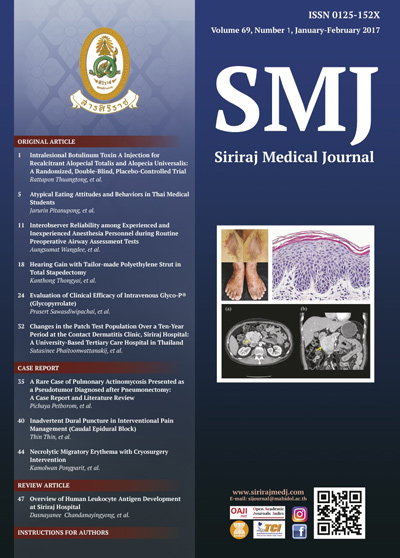Atypical Eating Attitudes and Behaviors in Thai Medical Students
Keywords:
Eating attitude, eating behavior, medical student, BMIAbstract
Objective: To determine the prevalence, and associated factors of atypical eating attitudes and behaviors in Thai medical students.
Methods: A cross-sectional survey examined the eating abnormalities in Thai medical students, conducted in 2014. Research assistants collected data by using; self-reported questionnaires using The Eating Attitudes Test-26 (EAT-26 Thai Version). The statistical analysis used R-program for qualitative variables and logistic regression was applied to determine the correlation and P-value.
Results: 141 Thai, medical students (15.9%) were reported to have atypical attitudes towards eating, and displayed abnormal eating behaviors. There was no statistically significant correlation of attitude towards eating, and their current eating behaviors according to the medical students’ gender, year of studying and Grade Point Average. However, their eating attitudes and behaviors were, associated with Body Mass index. Normal weight (BMI 18.5-23.49) and overweight (BMI 23.5-39.9) groups could increase by 2.2 (95% CI =1.2, 4.3) and 2.3 (95% CI=1.1, 4.8) times risk depending on atypical eating attitudes and abnormal eating behaviors respectively, when compared with the underweight group (BMI<18.5).
Conclusion: There was no correlated difference in concerns to the Thai medical student’s abnormal eating habits, with gender, years of their study and Grade Point Average. Only normal to over-weight BMI were associated. Overweight male, medical students significantly represented more atypical attitudes towards eating and behaviors than other groups in this population. These results may reveal the changing trends of eating attitudes and behaviors due to the current ideal body image of being more muscular. However, prospective studies are still needed.
Downloads
Published
How to Cite
Issue
Section
License
Authors who publish with this journal agree to the following conditions:
Copyright Transfer
In submitting a manuscript, the authors acknowledge that the work will become the copyrighted property of Siriraj Medical Journal upon publication.
License
Articles are licensed under a Creative Commons Attribution-NonCommercial-NoDerivatives 4.0 International License (CC BY-NC-ND 4.0). This license allows for the sharing of the work for non-commercial purposes with proper attribution to the authors and the journal. However, it does not permit modifications or the creation of derivative works.
Sharing and Access
Authors are encouraged to share their article on their personal or institutional websites and through other non-commercial platforms. Doing so can increase readership and citations.











